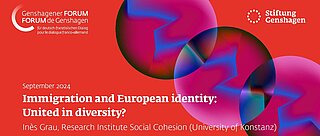Immigration and European identity: United in diversity?
- Forum Dialogu w Genshagen

While migration within and immigration to Europe is not a new phenomenon from a historical perspective, global migration movements have decisively shaped and changed the European Union over the last decade. Welcoming and supporting new immigrants in large numbers poses major challenges for local authorities and can become a breeding ground for social tensions. On the other hand, European societies are set to face significant challenges stemming from their ageing populations in the coming 50 years and immigration will likely be required to deal with a working-age population in structural decline. The paper addresses following questions: how is the increasing political influence of far-right parties, both at the national and regional level, impacting migration and diversity policies? How could the debate in society about migration be more constructive and less polarised? What best-practice examples already exist for dealing with cultural diversity in a migration society and with the integration of new immigrants? How can unity in diversity be promoted beyond the scope of laws and regulations at European and national level, as emerging from citizenship and civil participation?
This paper resulted from a workshop at the 12th Genshagen Forum for Franco-German Dialogue (June 27 and 28, 2024) with the topic “Disintegrated Societies? The Future of Cohesion in Europe”. The Genshagen Forum for French-German Dialogue has been organized since 2010. Considering the numerous challenges that Europe is facing, Germany and France must take responsibility regarding the future of the EU and join forces for the development of shared strategies. The Genshagen Forum actively encourages this process by promoting a result-oriented dialogue between mid-career leaders from both countries.